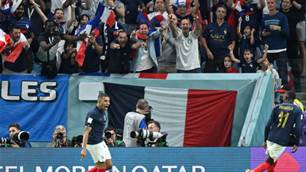FRANCE: After a storming World Cup in 2006, Franck Ribery has struggled to regularly spark France's midfield but Poland and Ukraine could see a turning point.
Raymond Domenech will be remembered almost entirely for the negative aspects of his reign in charge of France, yet the unpopular coach of the national team did take a handful of successful gambles, the most successful of which came in the lead-up to the 2006 World Cup, when he took the bold decision to call Franck Ribery into his preselected squad.
After a trio of substitute appearances in the pre-tournament friendlies, Domenech's ultimate decision to call the Marseille winger into the 23-man squad for the competition proper was seen as a major gamble, yet after starting his first international in the opening game, he would grow to be one of the key influences as Les Bleus reached the final.
Ribery has since gone from strength-to-strength following this breakout moment, and is a player who has been previously regarded among the finest in the world, at one stage challenging the duopoly of Cristiano Ronaldo and Lionel Messi for that title.
All this has come after a car accident when he was a toddler left him needing 100 stitches, leaving the permanent scar on his face that is now so associated with him. This disfiguration, Ribery claims, has given him the mental strength to successes in life, telling La Gazzetta dello Sport: "I'm proud of my scar. It gave me strength and forged my character.
"You have to be mentally strong to withstand the ridicule of other children and the stares of adults."
Ribery certainly needed all the resolve he could muster. Life as a footballer came relatively late to him, and for a period he was forced to labour while he still made a name for himself in the lower reaches of the French game with Boulogne, Ales and Metz before finally exploding with OM.
In terms of his style, flair is very much the watchword for the 29-year-old, who departed Marseille for Bayern Munich, where he has successfully carved a niche for himself as one of the most important players at one of the biggest sides in Europe, in 2007.
"When we signed him, it was as if we'd won the lottery," Franz Beckenbauer was to famously comment on the star.
Unlike many of his peers, the Domenech era seemed to bring out the best in Ribery, who was given immense responsibility under Les Bleus' previous coach and seemed to thrive under the spotlight of intense scrutiny that fell upon the side.
Much of France's game plan revolved around his wing play, and he would frequently respond by making vital contributions, such as scoring back-to-back winning goals in consecutive matches against a stubborn Lithuania side as Domenech's men muddled their way to Euro 2008.
During the last two years, though, Ribery has found life more difficult in the national team. Personal problems were a contributing factor to a disastrous World Cup 2010 campaign, both on an individual and team level, and though he's since regained his form for Bayern, the Ribery of old has not frequently been on display for Laurent Blanc's France.
The egotism that marked him out during Domenech's reign has been something of a burden in the new era, with some fans perceiving his desire to drive the French attack as a weakness as opposed to the strength it once was. The unforgiving crowd has been quick to get on the player's back, and as a result, his performances have dipped, though not for lack of effort.
Despite two difficult years, Ribery remains at the forefront of Blanc's plans, as any world-class talent must, and heading into Euro 2012, 'Le President' is seeking the best way to rejuvenate an outstanding player to his once former glory on the international scene.
If France can harness the talents of their most technically accomplished player, they really will be a force worth keeping tabs on in Poland and Ukraine.
Related Articles

Matildas criticise record crowd as not loud enough

Socceroos didn't believe advice that Tunisia was beating France













